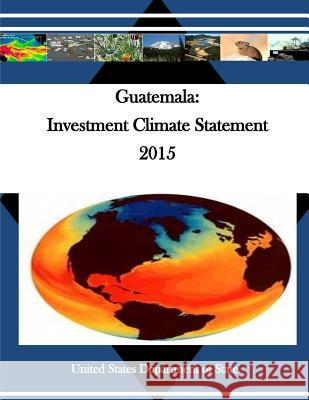Guatemala: Investment Climate Statement 2015 » książka
Guatemala: Investment Climate Statement 2015
ISBN-13: 9781530701179 / Angielski / Miękka / 2016 / 24 str.
Guatemala has the largest economy in Central America, with a USD 58.7 billion gross domestic product (GDP) in 2014, and an anticipated 4.1 percent growth rate expected in 2015. Remittances, mostly from the United States, increased by 8.6 percent in 2014 and were equivalent to 9.4 percent of GDP. The United States is Guatemala's most important economic partner. The Guatemalan government (GoG) continues to enhance competitiveness, promote investment opportunities, and work on legislative reforms aimed at supporting economic growth. More than 200 U.S. and other foreign firms have active investments in Guatemala, benefitting from the U.S. Dominican Republic-Central America Free Trade Agreement (CAFTA-DR). Foreign direct investment (FDI) stock was USD 12.1 billion in 2014, an 18 percent increase in relation to 2013. FDI is predominately in mining and energy infrastructure, and in the agricultural sector. Despite positive steps to improve Guatemala's investment climate, international companies choosing to invest in Guatemala face significant challenges. Complex and confusing laws and regulations, inconsistent judicial decisions, bureaucratic impediments, and corruption continue to constitute practical barriers to investment. Under CAFTA-DR obligations, the United States has raised concerns with the GoG regarding its enforcement of both its labor and environmental laws. In March 2015, the Presidents of Guatemala, El Salvador, and Honduras, and Vice President Biden signed a Joint Statement of Commitments to implement specifics of the Northern Triangle's Plan for the Alliance for Prosperity. They agreed to promote strategic areas of interest such as: energizing the productive sectors of the economy; creating economic opportunities; developing human capital, citizen security, and social inclusion; improving public safety and enhancing access to the legal system; and strengthening institutions to increase trust in the state. On April 8, 2015, a grant agreement between the Millennium Challenge Corporation (MCC) and the GoG was signed for a USD 28 million, three-year Threshold Program with Guatemala to provide quality educational opportunities and support GoG revenue mobilization reforms, both of which will address binding constraints to economic growth. Since 2006, the UN-sponsored International Commission against Impunity in Guatemala (CICIG) has undertaken numerous high-profile official corruption investigations, leading to significant indictments. CICIG has gained the endorsement of the private sector for its recent work against graft in the Customs and Tax Offices. Guatemala will hold national elections September 6 2015 and a run-off in the presidential race, should no candidate receive more than 50 percent of the vote, is scheduled October 25. We expect elections to be free and fair. The political situation in Guatemala is tense following a number of government corruption scandals and calls for widespread reform that started in April and promises a heated election cycle. Historically there have been limited cases of campaign violence centered on local elections and we expect that will continue in 2015. The change of administration will occur on January 14, 2016.
Zawartość książki może nie spełniać oczekiwań – reklamacje nie obejmują treści, która mogła nie być redakcyjnie ani merytorycznie opracowana.











